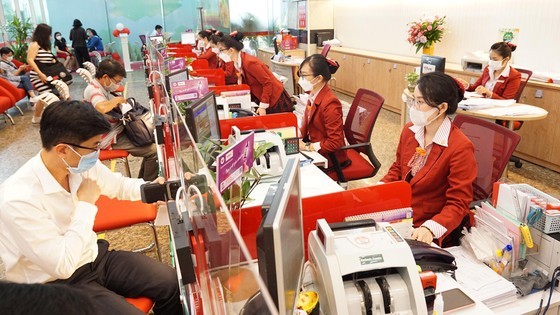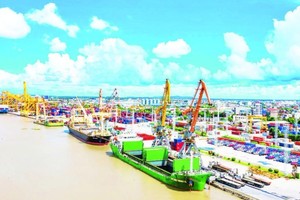 |
Illustrative photo. (Photo: SGGP) |
* Dr. Tran Du Lich, Member of the National Monetary and Financial Policy Advisory Council: Positive interest rates significantly affect the production activities of enterprises
The active efforts of the Government and the State Bank of Vietnam (SBV) in curbing inflation are undeniable. This contributes to maintaining economic stability and ensuring social security.
 |
"The current general situation is that enterprises lack the capital to reinvest and invest or the working capital to import raw materials for production. For many years, I have suggested that it is necessary to maintain an inflation target of around 5 percent - a level that ensures the economy will have ample capital space to grow and develop. Such high positive interest rates will affect the production activities of enterprises," he said.
Currently, the SBV prioritizes controlling inflation instead of increasing the total money supply, so the tool of interest rate reduction has not been implemented. To reduce interest rates, the SBV must use the refinancing tool to adjust. However, at present, the SBV has not boldly used this tool.
In fact, with high lending interest rates, domestic enterprises lose their competitive advantages because of high financial costs. Meanwhile, FDI enterprises can borrow at lower interest rates because they are not affected by high interest rates. Therefore, the management agency must operate the monetary policy to control inflation and reduce interest rates, at the same time, to support the economy.
When the total money supply increases, commercial banks are possibly at risk of increasing bad debts. However, commercial banks are profitable enough to sharply raise provisions for handling bad debts. Therefore, the Government needs to soon study using tools of the SBV to reduce interest rates to support businesses.
The current increase in lending interest rates is because Vietnam is maintaining a large positive policy. During the 2010-2011 period, deposit interest rates were up to 20-21 percent per annum, but inflation was 18-19 percent at that time. Currently, Vietnam's inflation is below 4 percent, but deposit interest rates are at 10-15 percent per annum, sometimes even 13-14 percent per annum. The positive rate of up to tens of percent is too high. Meanwhile, many countries worldwide do not implement a positive interest rate policy, or the real positive interest rate is negligible, only at 1-2 percent. If the positive interest rates are kept at a too high level, people will only focus on depositing money in banks and not want to do business. Although Vietnam maintains a positive interest rate to mobilize capital from the people, a too-high positive interest rate, as currently, will dampen business motivation.
* Mr. Nguyen Ngoc Hoa, Chairman of HCMC Union of Business Association: Creating a common voice between businesses and banks
Businesses and banks both need to maintain positive profits to survive and grow. However, in the context that banks still get huge profits while enterprises are exhausted and must sell themselves, it is not reasonable.
 |
Enterprises are loan partners of banks. On the contrary, banks also rely on stable operations and the development of enterprises to have lending partners. Therefore, in the context of increasing deposit interest rates, banks and businesses should discuss sharing the load capacity within the fluctuation range. For instance, the deposit interest rate is 7-9 percent per annum, and the lending interest rate is as high as 12-16 percent per annum. It means the difference between the deposit and lending interest rates is about 5-7 percent. Therefore, banks and businesses need to sit down to reduce this range, helping to enhance the burden capacity to overcome difficult times and maintain production stability for businesses.
The question is why countries in the region have inflation rates higher than Vietnam by 2-3 percent, but their enterprises can access loan interest rates ranging from 2-5 percent per year for medium and long-term capital. In fact, in other countries, the capital market has been formed for a long time. The capital flows for production, investment, and business activities are relatively diverse, from stocks, bonds, and capital mobilized from people. Therefore, in the face of economic fluctuations, the supply of investment capital is still not insufficient, ensuring enough space, even excess, for businesses, in particular, and the economy, in general, to grow well.
Meanwhile, in Vietnam, the majority of investment capital depends on the banking system, especially commercial banks. However, the banks' own capital is weak and relies on short-term savings mobilization from the people, making it vulnerable to economic fluctuations, especially inflation. Therefore, it is necessary to diversify investment capital sources by creating a safe and transparent legal corridor to attract more investment capital flows and meet the increasingly developed needs of businesses and the domestic economic growth scale.
* Mr. Nguyen Anh Duc, General Director of HCMC Union of Trade Cooperatives (Saigon Co.op): Balancing expenditure to support supply enterprises
Regarding capital, currently, businesses have to access loan interest rates ranging from 7 percent to 16 percent per annum. Moreover, since the beginning of 2022, they have also faced a situation in which raw materials, fuel, transportation, logistics, and labor costs have surged significantly. Meanwhile, they cannot increase selling prices as the purchasing power in the whole market has fallen sharply.
 |
To remove difficulties for domestic suppliers, Saigon Co.op has set a goal of reducing the loan balance to zero percent, creating a basis to cut operating costs, thereby supplementing the internal financial resources of the suppliers. Along with that, Saigon Co.op signed a credit limit of VND2.5 trillion with the banking system. This credit limit can be used to implement payment guarantees or connect support for supply enterprises to access capital sources. Or Saigon Co.op can use the loan for production and business activities. However, with lending interest rates ranging from 7 percent to 16 percent per annum, businesses dare not to borrow loans for reinvestment or investment expansion. The loan interest rate should be adjusted to around 5-7 percent per annum. Especially, it is necessary to create more favorable conditions regarding administrative procedures and public information disclosure for enterprises to access the 5.5-percent or 2-percent interest rate support packages.
























